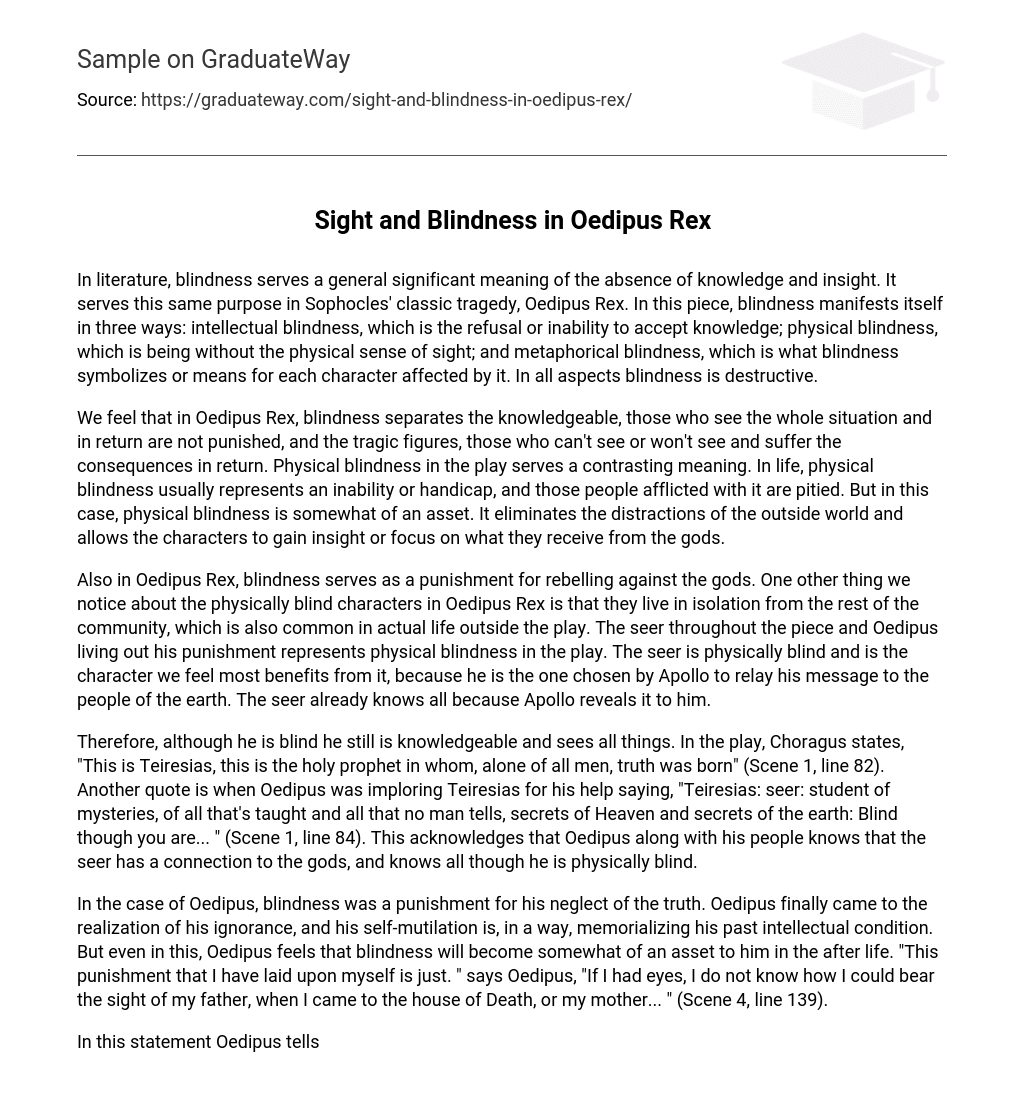In literature, blindness symbolizes the lack of knowledge and insight. This meaning is also portrayed in Sophocles’ Oedipus Rex. The tragedy showcases three forms of blindness: intellectual blindness, which is the rejection of knowledge; physical blindness, which is the absence of sight; and metaphorical blindness, which represents the symbolism or significance of blindness for each affected character. Overall, blindness is detrimental in all its forms.
In Oedipus Rex, blindness creates a division between those who are knowledgeable and are not punished, and the tragic figures who cannot or refuse to see and suffer the consequences. The play uses physical blindness to convey a contrasting meaning. Generally, physical blindness symbolizes incapacity or disadvantage, evoking pity for those afflicted. However, in this instance, physical blindness becomes an advantage. It removes the distractions of the external world, enabling the characters to gain insight and concentrate on what they receive from the gods.
In Oedipus Rex, blindness functions as a form of punishment for defying the gods. Additionally, the physically blind characters in the play are isolated from the community, mirroring real-life experiences. The seer and Oedipus exemplify physical blindness in the play. The seer, chosen by Apollo to convey his message to humanity, gains insight through his physical blindness as he is already aware of everything thanks to Apollo’s revelations.
Although Teiresias may be blind, he possesses great knowledge and the ability to perceive everything. In the play, Choragus refers to him as the holy prophet in whom truth dwells uniquely among all men (Scene 1, line 82). Oedipus, seeking Teiresias’ assistance, describes him as a seer who comprehends both the teachings and the unspoken mysteries of heaven and earth, despite his blindness (Scene 1, line 84). This emphasizes that Oedipus and his people recognize the seer’s divine connection and unlimited understanding despite his physical disability.
In the case of Oedipus, his neglect of the truth resulted in blindness as a punishment. Oedipus eventually realized his ignorance and his self-mutilation serves as a way to memorialize his past intellectual state. However, Oedipus also believes that blindness will benefit him in the afterlife. Oedipus asserts, “This punishment that I have imposed upon myself is fair. If I had sight, I don’t know how I could bear to look at my father or mother when I arrive at the realm of Death” (Scene 4, line 139).
In this statement, Oedipus acknowledges that his blindness is a self-imposed punishment and also serves as a shield against the pain of confronting his shamed parents. Similarly, numerous characters in the play suffer from intellectual blindness, denying the truth and resisting its acceptance. This condition is a prevalent human reaction in society, allowing individuals to deceive themselves into believing that disturbing truths are not as they appear.
Despite the fact that having this flaw can make a character more relatable to us, it does not excuse their actions or make them praiseworthy. One character who suffers from intellectual blindness is Jokaste, Oedipus’ mother. Even after realizing that she has committed incest with her own son, the same son that she and her husband had tried to abandon years ago, she still refuses to accept the truth that is right in front of her. “No,” Jokaste declares, “From now on, I will not give any consideration to oracles” (Scene 2, line 330). This quote demonstrates her submission to intellectual blindness and her refusal to heed the warning given by Apollo.
Here Jokaste dares to denounce the gods, a prime example of human emotion. Denying something doesn’t make it go away. In her refusal and anger, she begs Oedipus to stop questioning, as she already knows the answer. “For God’s love let us have no more questioning! Is your life nothing to you? My own is pain enough for me to bear.” (Scene 3, line 138), Jokaste says, expressing her desperation. Eventually, she cowardly commits suicide instead of continuing to deny her sin.
Teiresias, the embodiment of intellectual sight, possesses extensive knowledge about Oedipus’ situation. However, it is crucial to acknowledge that obtaining this knowledge in Teiresias’ case is challenging due to the belief that “ignorance is bliss”. It is simpler to overlook life’s harsh realities rather than confront them and find ways to cope with them. Teiresias goes as far as refusing to communicate his knowledge to Oedipus, declaring, “You are all ignorant. No: I will not disclose what I know. Now it brings me sorrow…” (Scene 1, line 112).
Even for a seer, the truth can be challenging. Teiresias acknowledges this when he says, “How dreadful knowledge of truth can be when there is no help in truth! I knew this well but did not act on it; else I should not have come” (Scene 1, line 101). He expresses his sorrow and highlights the fact that with power comes responsibility. Despite the difficulty, it is his duty to speak the truth. Similarly, like Jokaste, Oedipus initially refuses to accept his fate. The seer openly tells Oedipus, “But I say you, with both eyes, are blind: you cannot see the wretchedness of your life…” (Scene 1, line 196), pointing out his own blindness to Oedipus.
Despite Teiresias’ accusations, Oedipus tries to shift the blame onto Kreon, his brother-in-law, as a defense. Throughout the story, Oedipus elicits pity due to his helplessness. One possible reason for this sympathy towards Oedipus rather than his mother is his unwavering determination to uncover the truth, no matter how terrifying it may be. Ultimately, he continues on his quest for answers and asks, “Tell me who made these fine discoveries? Kreon?” (Scene 1, line 161). This quote reveals Oedipus’ tendency to hastily jump to conclusions instead of taking a step back to reflect on his situation and gain a broader perspective in order to analyze it more effectively.





